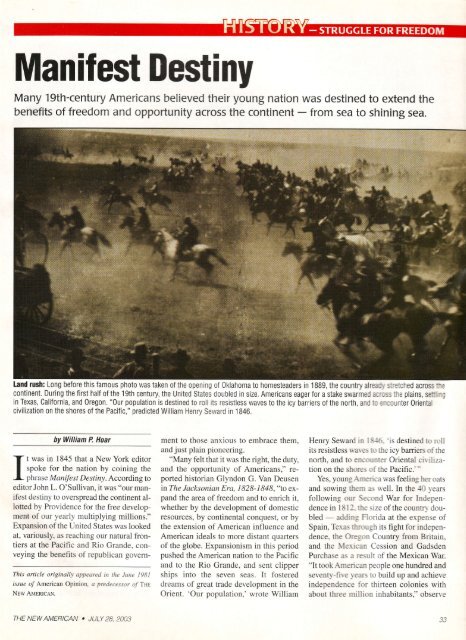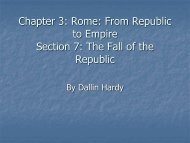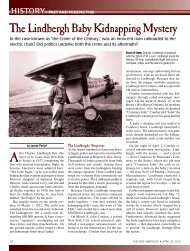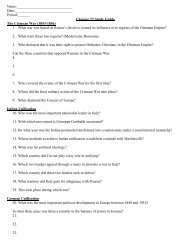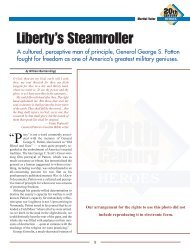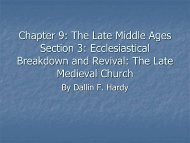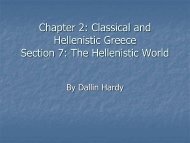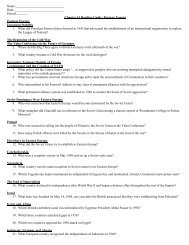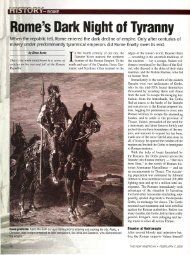Manifest Destiny
Manifest Destiny
Manifest Destiny
You also want an ePaper? Increase the reach of your titles
YUMPU automatically turns print PDFs into web optimized ePapers that Google loves.
<strong>Manifest</strong> <strong>Destiny</strong><br />
Many 19th-century Americans believed their young nation was destined to extend the<br />
benefits of freedom and opportunity across the continent - from sea to shining sea.<br />
Land rus[: Long before this famous photo was taken of the opening 0f oklahoma to homesteaders in 1889, the country alreaq sfetched across tE<br />
continent. During the first half ol the 1gth century, the united States doubled in size. Americans eager for a stake swarmed across lhe plains, setd rg<br />
in Texas, California, and 0regon. "0ur population is destined to roll its resistless waves to the icy barriers of the north, and lo ancounter 0rienhl<br />
civilization<br />
the sh0res of the Pacific," predicted William Henry Seward in 1846.<br />
by William P. Hoar<br />
t was in 1845 that a New York editor<br />
spoke for the nation by coining the<br />
phrase Maniftst <strong>Destiny</strong>.According to<br />
editor John L. O'Sullivan, it was o'our manifest<br />
destiny to overspread the continent allotted<br />
by Providence for the free developrnent<br />
of our yearly multiplying millions."<br />
Expansion of the United States was looked<br />
at, variously, as reaching our natural frontiers<br />
at the Pacific and Rio Grande, conveying<br />
the benefrts of republican govern-<br />
This article originally appeared in the June l98l<br />
issue of American Opinion, a predecessor of Tttu<br />
NBwArvrsnrcaN.<br />
ment to those anxious to embrace them,<br />
and just plain pioneering.<br />
"Many felt that it was the right, the duty,<br />
and the opportunity of Americans," reported<br />
historian Glyndon G. Van Deusen<br />
tnThe Jacksonian Era, IB2B-1848, "to expand<br />
the area of freedom and to enrich it,<br />
whether by the development of domestic<br />
resources, by continental conquest, or by<br />
the extension of American influence and<br />
American ideals to more distant quarters<br />
of the globe. Expansionism in this period<br />
pushed the American nation to the Pacific<br />
and to the Rio Grande, and sent clipper<br />
ships into the seven seas. It fostered<br />
dreams of great trade development in the<br />
Orient. 'Our population,' wrote William<br />
Henry Seward in n E-+6.<br />
'is destined to roll<br />
its resistless wa\ es [r-r trfoe icy barrien ot the<br />
north, and to encounter Oriental cir-llization<br />
on the shores of the Pacific.'"<br />
Yes, youngArnenca was feeling her oats<br />
and sowing thenn as rvell. In the -10 vears<br />
following our Second War for Independence<br />
in 1811. rhe size of the countrv doubled<br />
- adding Florida at the expense of<br />
Spain, Texa-s through its fight for independence,<br />
the Oregon Country from Britain,<br />
and the Nlerican Cession and Gadsden<br />
Purchase as a result of the Mexican War.<br />
"It tookArnerican people one hundred and<br />
seventy-five \-ears to build up and achieve<br />
independence for thirteen colonies with<br />
about three million inhabitants," observe<br />
THE NEW AMERICAN o JULY 28, 2OO3<br />
33
In the '<br />
for,<br />
Charles and Mary Beard rn The Beards'<br />
New Basic History of the United States."In<br />
less than one-third that span of years seven<br />
new states were established in the region<br />
immediately westward and occupied by a<br />
population larger than that of the whole<br />
United States when the census of 1790 was<br />
taken. In less than half that number of<br />
years five additional states were formed in<br />
the Louisiana Territory, still further west,<br />
Texas was brought into the Union, a vast<br />
arcato the southwest wrested from Mexico,<br />
and California admitted to statehood."<br />
Armed with liberty<br />
There was something special about the<br />
character of the early American, armed<br />
with liberty and a will to succeed, that even<br />
a foreigner could sense. Alexis de Tocqueville.<br />
a French aristocrat, visited us and<br />
wrote of our countrymen during the Jacksonian<br />
era in Democracy in America:<br />
In the United States, the greatest undertakings<br />
and speculations are executed<br />
without difficulty, because the<br />
poorest as well as the most opulent<br />
members of the commonwealth are<br />
ready to combine their efforts for<br />
these purposes. The consequence is,<br />
that a stranger is constantly amazed<br />
by the immense public works executed<br />
by a nation which contains, so to<br />
speak, no rich men. The Americans<br />
arrived but as yesterday on the territory<br />
which they inhabit, and they have<br />
aheady changed the whole order of<br />
nature for their own advantage. They<br />
have joined the Hudson to the Mississippi,<br />
and made theAtlantic Ocean<br />
communicate with the Gulf of Mexico,<br />
across a continent of more than<br />
Keeping European powets at bay: Following America's "Second War of Independence" in 1812,<br />
President James Monroe (above) and his Secretary of State John Quincy Adams boldly declared<br />
an end to further European colonization of the Americas. The "Monroe Doctrine" also wisely<br />
enjoined the United States to refrain from entanglements in Europe's wars.<br />
five hundred leagues in extent which<br />
separates the two seas.<br />
Even earlier than de Tocqueville's visit<br />
to this country, President James Monroe<br />
and Secretary of State John Quincy Adams<br />
spelled out the now-famous doctrine that<br />
proclaimed there would be no future European<br />
colonies in theAmericas; nor transfer<br />
to other European powers of possessions<br />
already held; and, that the United<br />
States would in turn stay out of European<br />
wars just as the U.S. expected Europeans<br />
to stay out of conflicts in this Hemisphere.<br />
President Monroe and Secretary Adams<br />
proposed this policy, but it would have to<br />
be left to others - especially James Polk<br />
- to enforce it.<br />
In Monroe's second Inaugural, says<br />
Pulitzer Pnze historian George Dangerfield<br />
in The Era of Good Feelings,the president<br />
''recalled the passing of the War of<br />
1812. the building of coast fortifications<br />
from the St. Croix to the Sabine in a spirit<br />
of 'peace and -eoodwill,'the ratification of<br />
the Florida Treaty, the 'peculiar felicity' of<br />
the United States in being altogether unconnected<br />
with the causes of war which<br />
seemed to menace Europe. He noted that<br />
he had been able to repeal the internal<br />
taxes, and he expressed his belief that 'the<br />
present depression in prices'would be temporary;<br />
while, as a proof of the 'extraordinary<br />
prosperity' of the nation, he offered<br />
the payment of nearly $67,000,000 of the<br />
public debt. He declared that no serious<br />
conflict had arisen between national and<br />
state governments, and announced that<br />
a<br />
c)<br />
c<br />
o<br />
-6<br />
E<br />
J<br />
34<br />
THE NEW AMERICAN . JULY 28, 2003
,''j<br />
il+<br />
Pushing back the ftontiet, immigrants from Europe moved westward, across the "Great American<br />
Desert," in search of opportunity and prosperity. "Millions of men are marching at once towards the<br />
same horizon," wrote Alexis de Toqueville. "Their language, theireligion, their manners differ; their<br />
object is the same. Fortune has been promised them somewhere in the West, and to the West thev<br />
go to find it."<br />
'there is every reason to believe that our<br />
system will soon attarn the highest degree<br />
of perfection of which human institutions<br />
are capable."'<br />
So, at times, it seemed. The Erie Canal,<br />
for example, was built without federal<br />
help. But the success of this project only<br />
motivated those who would have a central<br />
government finance similar internal improvements.<br />
"The American republic had<br />
come into existence," noted George Dangerfield,<br />
"by overthrowing a tyrant who<br />
ruled from afar: was it now to put itself into<br />
the hands of another tyrant, ruling only a<br />
little less remotely on the borders of Virginia<br />
and Maryland? Was it not always true<br />
that political power in remote hands was<br />
almost certain to be abused? Before the<br />
dismayed eyes of those who remembered<br />
and cherished the warnings of Thomas Jefferson,<br />
and before the eyes of Jefferson<br />
himself at Monticello, there spread a vision<br />
of a mass of internal-improvement legislation,<br />
entangled in local schemes, confused<br />
by jealousies, and saturated with greed and<br />
corruption." There is nothing new under<br />
the sun.<br />
Secretary of State John Quincy Adams<br />
was in factanexpansionist not only for the<br />
United States but also for American government.<br />
It is of course well known that<br />
during the Monroe administration he<br />
pressed the Adams-Onis Treaty of 1819.<br />
Through that treaty, Spain, as recounted by<br />
Frederick Merk in Manifust <strong>Destiny</strong> and<br />
Mission in American History, "ceded East<br />
Florida to the United States, gave recognition<br />
to an American seizure of West Florida,<br />
and transferred Spanish claims to the<br />
Pacific Northwest north of the line of 42o<br />
to the United States." Less well known is<br />
the fact that later, as president, John Quincy<br />
Adams asked Congress in his first annual<br />
message for what were then considered<br />
vast national powers - including<br />
scientific expeditions, an astronomical<br />
observatory, a national university, various<br />
internal improvements, and creation of a<br />
Department of the Interior. These measures,<br />
complained Thomas Jefferson, "will<br />
be to them [the Federalists] a next blessing<br />
to the monarchy of their first aim, and perhaps<br />
the surest stepping stone to it." Adams<br />
had affronted representative government<br />
by demanding that the Establishment of<br />
the day not be "palsied by the will of our<br />
constituents. ..."<br />
Such sentiments, aired in public, led<br />
many to believe that theAdams family was<br />
a nest of monarchists. And all of this prepared<br />
the climate for the 1828 election of<br />
war hero Andrew Jackson. Old Hickory's<br />
policy was simply summarized by him:<br />
"The Federal Constitution must be obeyed,<br />
state rights preserved, our national debt<br />
must be paid, direct taxes and loans avoided,<br />
and the Federal Union preserved. These<br />
are the objects I have in view, and regardless<br />
of all consequences, will carry into effect."<br />
Growth and change in the nation before<br />
Jackson became president were<br />
profound, and they continued dramatically<br />
during his term in office.<br />
"While General Jackson was President.''<br />
reports Bray Hammond tn Banks and Politics<br />
in America, "the federal union came<br />
to include twice as many states as it had<br />
begun with and held territory that recenrlr<br />
had belonged to Spain and France. It u a,*<br />
shortly to add regions in the South and<br />
West taken from Mexico and regions in the<br />
Northwest that Great Britain claimed. Its<br />
expansion seemed irresistible."<br />
Indeed, migration, growth. and expansion<br />
were watchwords of the era. John<br />
Quincy Adams had spoken of "our natural<br />
dominion in North America." But all did<br />
THE NEW AMERICAN o JULY 28, 20a3
not swoon over the frontier. We learn from<br />
Samuel Eliot Morison and Henry Steele<br />
Commager's The Growth of the American<br />
Republic: "Major [Stephen] Long's expedition<br />
of 1819 reported the Great Plains<br />
'almost wholly unfit for cultivation,' and<br />
laid down on the map of thatregion, which<br />
now supports a thriving population of several<br />
millions, the legend 'GreatAmerican<br />
Desert.'" Daniel Webster opposed<br />
even a postal route from<br />
Missouri to the Oregon territory, saying:<br />
"What do we want with this vast,<br />
worthless area? This region of savages<br />
and wild beasts, of deserts, or those<br />
endless mountain ranges, impenetrable,<br />
and covered to the very base with<br />
eternal snow? What can we ever hope<br />
to do with the western coast, a coast<br />
of three thousand miles, rock-bound,<br />
cheerless, uninviting, and not a harbor<br />
on it?"<br />
But the people thought otherwise.<br />
Europeans were moving to America<br />
even asAmericans were focusing their<br />
attention on the West. The invaluable<br />
de Tocqueville reported of his visit<br />
here:<br />
It is theAmericans themselves who<br />
daily quit the spots which gave<br />
them binh, to acquire extensive domains<br />
in a remote region. Thus the<br />
European leaves his cottage for the<br />
transatlantic shores, and the American,<br />
who is born on that very coast,<br />
plunges in his turn into the wilds of<br />
central America. This double emigration<br />
is incessant; it begins in the<br />
middle of Europe, it crosses the Atlantic<br />
Ocean, and it advances over the<br />
solitudes of the New World. Millions<br />
of men are marching at once towards<br />
the same horizon; their language,<br />
their religion, their manners differ;<br />
their object is the same. Fortune has<br />
been promised them somewhere in<br />
the West, and to the West they go to<br />
find it.<br />
No event can be compared with<br />
this continuous removal of the human<br />
race, except perhaps those eruptions<br />
which caused the fall of the Roman<br />
Empire. Then, as well as no% crowds<br />
of men were impelled in the same direction,<br />
to meet and struggle on the<br />
same spot; but the designs of Providence<br />
were not the same. Then every<br />
newcomer brought with him destruction<br />
and death; now everyone brings<br />
the elements of prosperity and life.<br />
There was life indeed. Inl79O the population<br />
of the United States was estimated at<br />
fourmillion: bv 1848. weAmericans num-<br />
Taking down the central bank: As President, Andrew<br />
Jackson - war hero and champion of the populist<br />
cause - presided over payment of the U.S. national<br />
debt. He also dissolved the unconstitutional Bank of the<br />
United States, an institution he said was used by "the<br />
rich and powerful [to] bend the acts of government to<br />
their selfish purposes...."<br />
bered an impressive twenty-two million.<br />
Virtually in the middle of that expansion<br />
Andrew Jackson commented:<br />
"[F]rom the earliest ages of history to<br />
the present day there never have been<br />
thirteen millions of people associated<br />
in one political body who enjoyed so<br />
much freedom and happiness as the<br />
people of these United States. You<br />
have no longer any cause to fear danger<br />
from abroad.... It is from within,<br />
among yourselves - from cupidity,<br />
from comrption, from disappointed<br />
ambition and inordinate thirst for<br />
power - that factions will be formed<br />
and liberty endangered...."<br />
Bank Battle<br />
The conduct of the nation's financial affairs<br />
concerned President Jackson as much<br />
as America's frontiers. In fact, though<br />
Andy Jackson would himself die in debt,<br />
in 1835 he saw to it that our National Debt<br />
was paid. And his famous fight with the<br />
Bank of the United States was an epoch<br />
battle against conspiracy and monopoly.<br />
As George Roche has observed of<br />
the Age of Jackson in his book The<br />
Berildered Society: "The assault on<br />
economic privilege carried over from<br />
the banking struggle and came to include<br />
tariffs and subsidies. The Jacksonians<br />
were squarely in the American<br />
tradition of insisting upon free<br />
competition and a minimum of interference,<br />
whether public or private,<br />
with the independence and opportunity<br />
of the individual. Jackson himself<br />
was a westerner whose primary appeal<br />
to a rising middle class was<br />
equality before the law and resistance<br />
to unwarranted centralization.<br />
whether in economics or politics."<br />
Contemporary crrtics of Jackson<br />
a ac)<br />
portrayed him as a monarch, but his<br />
c<br />
sympathies and policies were motivated<br />
by the welfare of the Middle<br />
O<br />
o<br />
American. Indeed, even among the influential<br />
business community, report-<br />
:<br />
ed Claude G. Bowers tn The Party<br />
Battles of the Jackson Period, "the<br />
feeling was gerrninating that Jackson<br />
was not far wrong in the conclusion<br />
that a moneyed institution possessing<br />
the power to precipitate panics to influence<br />
government action, was dangerous<br />
to the peace, prosperity, and<br />
the liberty of the people."<br />
Rechartering the Bank of the United<br />
States became a campaign issue in 1832,<br />
and when Congress voted to maintain the<br />
status quo with the central financial institution,<br />
President Jackson vetoed the legislation<br />
and removed government funds<br />
from the bank. Nicholas Biddle, president<br />
of the bank, fought to maintain his power,<br />
contracting credit to punish the government<br />
for its action - to the point where<br />
discount rates rose as high as 36 percent.<br />
By flexing the bank's muscles, however,<br />
Biddle proved Jackson's point about its potential<br />
as a nefarious force. By 1841 it was<br />
forced to liquidate.<br />
Here is part of the famous veto message<br />
THE NEW AMERICAN . JULY 28, 2003
that President Andrew Jackson sent Congress,<br />
calling the central bank unconstitutional:<br />
"It is to be regretted that the rich and<br />
powerful too often bend the acts of government<br />
to their selfish purposes.... In the<br />
full enjoyment of the gifts of Heaven and<br />
the fruits of superior industry, economy,<br />
and virtue, every man is equally entitled to<br />
protection by law; but when the laws undertake<br />
to add to these natural and just advantages<br />
artificial distinctions, to grant titles,<br />
gratuities, and exclusive privileges, to<br />
make the rich richer and the potent more<br />
powerful, the humble members of society<br />
- the farmers, mechanics, and laborers -<br />
who have neither the time nor the<br />
means of securing like favors to themselves,<br />
have a right to complain of the<br />
injustice of their Government.... In the<br />
act before me there seems to be a wide<br />
and unnecessary departure from ...<br />
just principles."<br />
President Jackson was easily<br />
re-elected. There were more Middle<br />
Americans, it seems, than big bankers.<br />
"The Jacksonian revolution," reports<br />
Banks and Politics inAmerica,"was a<br />
consequence of the Industrial Revolution<br />
and of a farm-born people's realtzation<br />
that now anyone in America<br />
could get rich and through his own efforts,<br />
if he had a fau chance.... The<br />
humbly born and rugged individualists<br />
who were gaining fortunes by<br />
their own toil and sweat. or wits. were<br />
still simple Americans, Jeffersonian,<br />
anti-monopolistic, anti- governmental,<br />
but fraught with the sense of what<br />
soon would be called manifest destiny....<br />
lSuchAmericans] made the age<br />
of Jackson a festival of laisser faire<br />
preclusive to the age of Grant and the<br />
robber barons."<br />
helped bring about the<br />
Westward Ho!<br />
the United States<br />
After the bitter winters of the late<br />
1830s, Americans again turned to the<br />
West in ever greater numbers, aided by the<br />
rapid development of canals, roads, and Texas<br />
railroads. 'As soon as it became evident<br />
that little help could be expected from the<br />
Federal Government for internal improvements,"<br />
note Samuel Morison and Henry<br />
CommagerrnThe Growth of the American<br />
Republic, "other states followed NewYork<br />
lwith its Erie Canal] in constructing canals,<br />
or lending their credit to canal corpora-<br />
tions. Ohio linked the Great<br />
Lakes with the Mississippi<br />
valley by canal in 1833-34.<br />
Cleveland rose from a petty<br />
frontier village to a great lake<br />
port by 1850; Cincinnati, at<br />
the other end of the state<br />
canal system, sent pickled<br />
pork down the Ohio and<br />
Mississippi by flatboat and<br />
steamboat, shipped flour by<br />
canal boat to NewYork. and<br />
in 1850 had a population of 115,000 -<br />
more than that of NewYork in 1815."<br />
Jackson's secretarv of state. Martin Van<br />
Harrison. President Harrison's runningmate<br />
was John Tyler, who succeeded him<br />
in very short order and annexed Texas just<br />
before he left the White House to<br />
make room for James Polk. President<br />
Polk was elected on an expansionist<br />
platform over Henry Clay, the straddling<br />
Whig.<br />
The Polk election came in the midst<br />
of more westward expansion. Accordin-e<br />
to The Growth of the American Republic:<br />
"The Oregon Trail and the<br />
Lone Star Republic appealed to a people<br />
recovering confidence after the<br />
hard times of 1837 to 1840. The 'manifest<br />
destiny' of the United States to<br />
expand westward and southward ...<br />
became the theme of countless newspaper<br />
articles, Fourth of July orations,<br />
and political speeches. Much talk<br />
there was, too, of Anglo-Saxon genius<br />
in colonization and self-government....<br />
The slogans of 1844, 'Reoccupation<br />
a<br />
of<br />
a<br />
c)<br />
Oregon and reannexation of Texas'<br />
'Fifty-four forty or fight,' rallied thl<br />
same sort of people who shouted<br />
(s '<br />
_o '-J Tippecanoe and Tyler too' in 1840...."<br />
Expansionist president: Elected in 1844 on a platform The Oregon Country was made up<br />
calling for the U.S, to expand westward and southward, of not only the present state bearing<br />
James K. Polk engineered a compromise with the that name, but also Washington, Idaho,<br />
British regarding the disputed 0regon Territory. This<br />
single greatest enlargement of<br />
under anv administration.<br />
apart of Montana, andBritish Columbia<br />
up to the aforementioned 54o 40'.<br />
All of this, said Polk, was American<br />
territory " clear and unquestionable."<br />
As it turned out, of course, Pork com-<br />
Buren, failed in his attempt to purchase promised with the British, with whom we<br />
from Mexico. But, later as president, had been jointly occupying Oregon, and<br />
Van Buren stayed aloof from the Texas agreed to a settlement - opposed for a<br />
question, and in so doing lost much of his time by Secretary of State James Buchanan<br />
popularity for refusing to annex Texas as - at the 49th parallel. Polk followed his<br />
the Lone Star Republic wanted. Van own advice to a congressman whom he<br />
Buren's temporizing on the Texas issue, as considered timid towards London<br />
well as economic panic in the country dur- namely, that "the only way to treat John<br />
ing his administration, cost him the 1840 Bull was to look him straight in the eye,<br />
election to William Henry "Tippecanoe" that he considered a bold and firm course<br />
c,)<br />
c<br />
o<br />
O<br />
o<br />
rhich they inhabit, and they<br />
y changed the whole order of<br />
THE NEW AMERICAN . JULY 28, 2OO3
J<br />
on our part the pacific one."<br />
As a matter of fact the U.S. had long<br />
been willing to accept the 49th parallel, but<br />
had been rebuffed by the British. Furthermore,<br />
Polk did not want war simultaneously<br />
with Mexico (which seemed imminent)<br />
and Britain. The compromise gave<br />
both Canada and the United States aPacific<br />
outlet. And, observed Samuel Morison<br />
in The Oxford History of the American<br />
People, except "for a minor controversy<br />
over the islands of Puget Sound, this western<br />
end of the lengthy frontier between<br />
Canada and the United States gave no further<br />
trouble."<br />
The signing of the Oregon treaty meant<br />
the American Republic now reached from<br />
Atlantic to Pacific. President Polk surely<br />
felt, wrote historian GlyndonVan Deusen,<br />
"that ports on the Pacific were more important<br />
than territory; that the area north of<br />
the 49th parallel was not worth a war, so<br />
long as the United States had access<br />
through the Vancouver Straits to the ocean;<br />
and that compromise with the British in<br />
Oregon was necessary if they were to be<br />
kept from getting a slice of a greater pize,<br />
California."<br />
Young Hickory, as James Knox Polk<br />
was called, was carrying on as Old Hickory<br />
wished. (Polk was the youngest president<br />
elected to date.) Andy Jackson, says<br />
Frederick Merk in <strong>Manifest</strong> <strong>Destiny</strong> and<br />
Mission in American History, still "lent<br />
glamour to <strong>Manifest</strong> <strong>Destiny</strong>." The former<br />
president "sent repeated letters in the years<br />
preceding his death lin 1845] to friends<br />
urging the annexation of Texas and the occupation<br />
of Oregon, and these were usually<br />
promptly transmitted to the press. Jackson<br />
urged annexation to insure the national<br />
safety and interest and to checkmate the<br />
machinations of the British."<br />
Above all was that matter of Texas, over<br />
which Henry Clay had lost the presidency<br />
in 1844, alienating both North and South,<br />
abolitionist and slaveowner. Clay viewed<br />
the annexation as a judgment about states'<br />
rights and slavery. On the one hand, according<br />
to Clement Eaton rn Henry CIay<br />
and the Art of American Politics, Mr. Clay<br />
"declared that he personally had no objection<br />
to the annexation of Texas, but that he<br />
was unwilling to see it made an issue<br />
which 'jeoparded' [sic] the Union. He<br />
protested against the positions of the extremists<br />
of South Carolina who wished<br />
to make the recent rejection of the Texas<br />
treaty an occasion to dissolve the<br />
L]nion."<br />
But, as we have said, the Polk people<br />
o<br />
a<br />
c)<br />
c<br />
()<br />
C!<br />
-o<br />
:<br />
wanted annexation - or "reannexation,"<br />
since it was considered to be part<br />
of the Louisiana Purchase given up by<br />
J.Q. Adams. And that was not all that<br />
Young Hickory had in mind. Indeed,<br />
President Polk told his Navy secretary:<br />
"There are four great measures which<br />
are to be the measures of my administration:<br />
one, a reduction of the tariff; another,<br />
the independent treasury; a third,<br />
the settlement of the Oregon boundary<br />
territory; and lastly, the acquisition of<br />
California." The first.,three wercfaits accomplis<br />
by 1846, but the latter required<br />
war with Mexico.<br />
Polk saw in California a ground for<br />
possible European intrigue proscribed<br />
by the Monroe Doctrine. The same<br />
was true of the Oregon Country and<br />
Mexico, "where the United States had<br />
interests of its own." notes Frederick<br />
I<br />
()<br />
a<br />
6<br />
-<br />
3B<br />
An entire generation of political and<br />
military leaders emerged from the<br />
battlefields of the Mexican-American War,<br />
including four American presidents:<br />
.^ (clockwise f10m upper left) Zachary Taylor,<br />
a Franklin Pierce, James Buchanan, and<br />
E' Confederate President Jefferson Davis.<br />
? lronically, the most notable figure to emerge<br />
F from that war was a congressman who<br />
! vehemently opposed it: Abraham Lincoln.<br />
THE NEW AMERICAN . JULY 28, 2003
Merk inThe Monroe Doctrine and American<br />
Expansionism. "There, especially, he<br />
wished Europe held at bay. Again, in Monroe's<br />
case, the emphasis had been upon<br />
military adventures by Europe, upon interferences,<br />
by force or other means, to oppress<br />
or control New World governments.<br />
Polk was concerned about other kinds of<br />
interferences and seemed to include aid to.<br />
and even advice to, independentAmerican<br />
governments among the forbidden activities.<br />
The Polk version of the Monroe<br />
message attained major importance in<br />
American history. It swayed decisions<br />
until well into the twentieth century."<br />
Mexican War<br />
As it happened, in an era when the United<br />
States was seriously thinking of<br />
abolishing the Military Academv ar<br />
West Point, the war with Mexico broke<br />
out ... and the anti-militariss were put<br />
to flight. We were soon defeating Mexico<br />
with but7,2A0 ffoops ia our regular<br />
Army compared to some 27,000 welltrained<br />
Mexican forces whose leaders<br />
contended their "Eagle and Serpent"<br />
would be flying over the White House.<br />
American troops were soon in the Halls<br />
of Montezuma.<br />
'Acquisition of territory by conquest<br />
was a question the Cabinet had considered<br />
the day the war was formally declared,"<br />
noted Frederick Merk in Maniftst<br />
<strong>Destiny</strong> and Mission in American<br />
History. "It had been broached by<br />
Buchanan. He proposed issuing a declaration<br />
to foreign governments that the<br />
From coasto coast The sun sets over the Pacific<br />
war was not for conquest or for any dismemberment<br />
of Mexico, that its pur-<br />
fulfilled John O'Sullivan's prediction that our nation<br />
coast 0f the United States. By 1853, America had<br />
pose was simply self-defense. This proposal<br />
was a characteristic exhibit of his ours."<br />
would expand until "the whole boundless continent is<br />
weakness. It was squashed immediately<br />
and completely by the President.<br />
Such a declaration, Polk said, would be bonanza the news of which was just beginning<br />
to spread as the treaty reached the<br />
improper and unnecessary. The war would<br />
not be fought for conquest, 'yet it was clear final stages of ratification," recounted<br />
that in making peace we would if practicable<br />
obtain California and such other por-<br />
The Mexican War sent a message that<br />
Glyndon Van Deusen.<br />
tion of the Mexican territory as would be we meant to determine our own destiny<br />
sufficient to indemnify our claimants on and that Texas was indeed a part of the<br />
Mexico and to defray the expenses of the<br />
'war.'"<br />
Eventually four American presidents<br />
would be elected as a result of fame resulting<br />
from their roles in the war with<br />
Mexico - they were General Zachary<br />
Thylor, Franklin Pierce, James<br />
Buchanan, and Confederate<br />
President Jefferson Davis.<br />
When the war with Mexico<br />
was over, having cost us<br />
13,000 dead, we "emerged<br />
from it with 529,000 square<br />
miles of additional territory, a<br />
magnificent outlet to the trade<br />
of the Pacific, and hundreds of<br />
millions in California gold, a<br />
(u<br />
E<br />
,,cguld<br />
re-establishing a foothold in North<br />
America, foreshadowing at the same<br />
time the growing might of the United<br />
States."<br />
In fact, from the period before Texas<br />
was brought into the Union to 1848, the<br />
United States added 1.2 million square<br />
miles to its dominion, and in 1853 filled<br />
out part of Arizona with a $10 million<br />
deal known as the Gadsden Purchase.<br />
The Mexican War had concluded with<br />
President Polk paying for title to the<br />
conquered land - a sum that was no<br />
more than he had offered before the<br />
conflict began.<br />
Despite the controversies, such as the<br />
slavery issue in the new territory, "the<br />
United States had gained an immense<br />
new domain, and the dream of some of<br />
her greatest leaders - a two-ocean nation<br />
- had been fulfilled." notes Paul<br />
Wellman inThe House Divides. "With<br />
the later Gadsden Purchase, all the present<br />
states of Texas, New Mexico, Arizona,<br />
California, Utah, and Nevada, together<br />
with portions of Kansas,<br />
Colorado, and southernWyoming were<br />
acquired. It was a territory for the most<br />
part completely wild and in many parts<br />
even unexplored, but it was destined to<br />
exert enormous influence on the later course<br />
of American history." In short, James K.<br />
Polk oversaw the greatest territorial expansion<br />
in the history of the Republic.<br />
The wilderness had been opened and<br />
American government spread coast to<br />
coast. <strong>Manifest</strong> <strong>Destiny</strong> had in fact caused<br />
Union. Foreigners were made to under- the American Eagle to spread her wings<br />
stand, concluded Burt Hirschfield in After over the entire land. As editor John O'Sulthe<br />
Alamo, that the Mexican War "under- livan had said: "Yes, more, more, more!...<br />
scored certain truths - it meant the conti- till our national destiny is fulfilled and ...<br />
nent was rounded under American rule, the whole boundless continent is ours."<br />
putting an end to any European hopes of From sea to shining sea. I<br />
THE NEW AMERICAN o JULY 28, 2OO3<br />
39


